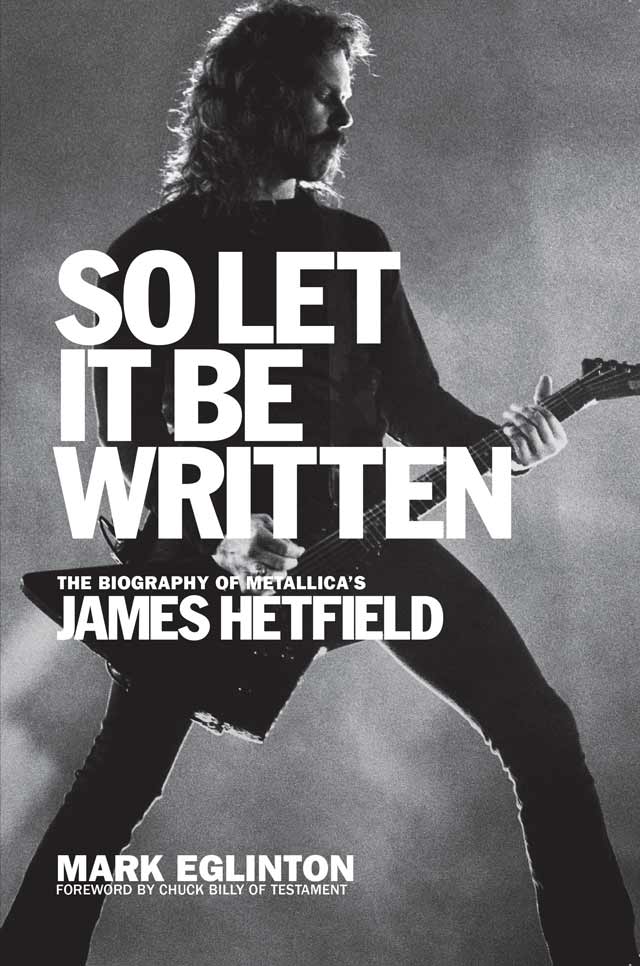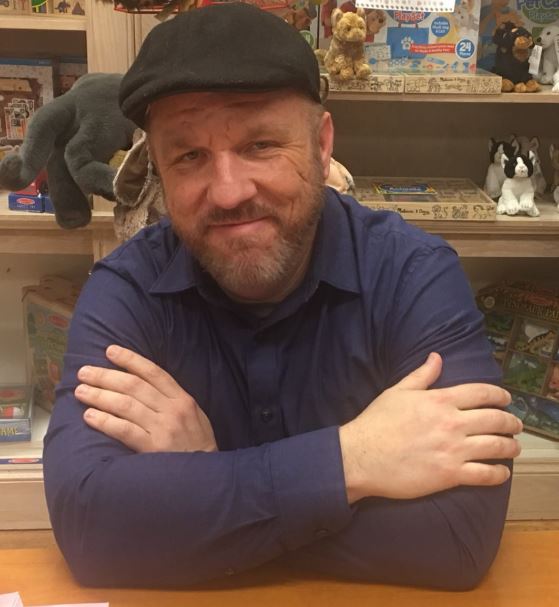New James Hetfield Biography: An Interview with Author Mark Eglinton

Mark Eglinton'sSo Let It Be Written: The Biography of Metallica’s James Hetfield is the first biography of a living member of Metallica.
In the book, which will hit shelves April 11 via Lesser Gods, Eglinton uses exclusive, firsthand interviews with artists and celebrities who have crossed paths with the guitarist, including other members of Metallica, Testament's Chuck Billy (who wrote the book's foreword), Charlie Benante (Anthrax), Jerry Cantrell (Alice In Chains) and Rex Brown (Pantera), to construct the definitive account of Hetfield—at least up to this point.
Before becoming one of metal’s biggest personalities, Hetfield overcame several barriers throughout his adolescence, including his parents’ divorce, his mother’s death and severe alcoholism. Eglinton's book provides the ultimate insider’s look at the man who turned it all around and became a metal god.
I recently spoke to Eglinton about So Let It Be Written, and you can check out our interview below. For more about Eglinton, visit mark-eglinton.com.
What made you decide to write a biography about Hetfield?
I’ve been a fan of the band my whole life, and this idea probably goes back to when I met James for the first time in 1986. I met James and Cliff Burton when Metallica played in my hometown, Edinburgh, Scotland. This was the week before Cliff died, so in retrospect, it was a pretty significant meeting.
James struck me as someone who had a lot of thinking going on but maybe didn't know how to express it. As time went on, it became an interesting idea to see how he had evolved. On a basic level, it also surprised me that no biography had ever been written about him. Those two things in combination made it a pretty easy decision.
What made the music of Metallica so special for you back then?
I was into a lot of the bands that were around at that time—1984 to '86—but was looking for something a bit heavier. When I heard Metallica for the first time, it was like inventing the wheel. It was a sound that was so different, so new and so aggressive. It wasn't radically different from heavy metal but it was being done in a way that no one had ever done before. They’ve always maintained that interest for me.
All the latest guitar news, interviews, lessons, reviews, deals and more, direct to your inbox!
What was the writing process like?
My aim with this book was to contact people who had never spoken about James before. It wasn't always easy because these people weren't necessarily well-known or maybe even wanted to be contacted. Quite often, someone I would speak to would lead me down another alleyway to someone else. It was a case of contacting people, building the interviews and then fitting them into the narrative.
Was there anything you learned about James or the band that surprised you?
The thing that seemed to pop up and interest me the most was the presence of a guy named Hugh Tanner. There were lots of guys talked about in the early days of the band’s history who were influential, but Hugh was one guy that was never mentioned. He was one of James’ best friends in high school and was a solid influence when James was going through tough times and upheaval with his family. It turned out that not only were they friends, but Hugh was involved with coming up with some of the ideas that ended up on Metallica's first album.Metallica has gone through a lot of challenges over the years. What do you think makes them able to overcome adversity?
I think a big part of it is the Hetfield/Lars Ulrich axis. Without either one of them, Metallica couldn’t function. Losing Cliff was a huge moment, but then they got Jason [Newsted] and reinvented the band.
On a more up-to-date level, when Jason left, you could argue that might have been the time when they were most likely to implode. But they got Robert Trujillo, who I believe is a huge reason Metallica are enjoying the success they are now. They're immune to criticism and will always survive it.
What do you think was Metallica’s greatest achievement?
That’s very simple for me. It’s how they were able to cross the boundary from being an extreme, niche band to a mega-band.
A lot of bands played the kind of music Metallica played in the Eighties and Nineties, but Metallica is the only band who crossed that divide, and they did that by releasing the Black Album [Metallica] in 1991. That changed heavy metal forever. Getting Bob Rock to produce that album...and the single “Enter Sandman” took them into a different territory. No other band has replicated that.
What would you like readers to take away from reading So Let It Be Written?
It's something that’s universal. James was like any teenager going through rough times, which on the surface might look insurmountable as far as getting anywhere in life. Some people may have succumbed to other paths, but James had posters of Aerosmith on his bedroom wall and even wrote in his yearbook that he was going to be a rock star.
He did it because he dedicated himself to it. My hope is that people who read this book can see what James did, and if they find themselves in a similar situation where things can go one of two ways, that they choose the way where they can make something positive happen in life.

James Wood is a writer, musician and self-proclaimed metalhead who maintains his own website, GoJimmyGo.net. His articles and interviews are written on a variety of topics with passion and humor. You can follow him on Twitter @JimEWood.
James is a guitarist and freelance writer who's interviewed some of the biggest names in music. He is the author of four books and his writing credits include work for Guitar World, AXS and Yahoo! as well as for his hometown newspaper where he writes on a variety of topics with both passion and humor. As a guitarist, he's performed everywhere from local bars and nightclubs to some of the biggest stages in front of thousands of music fans.

